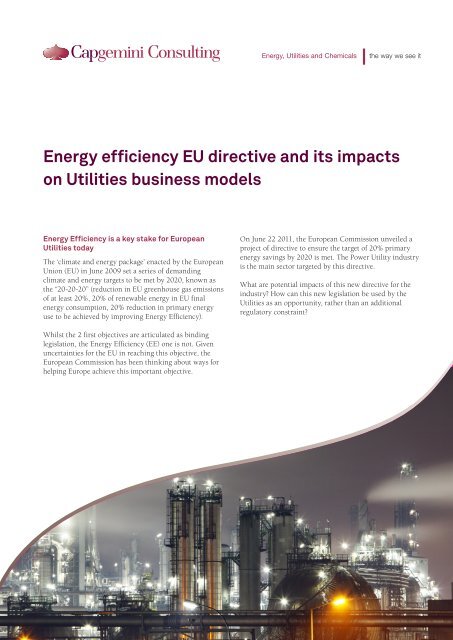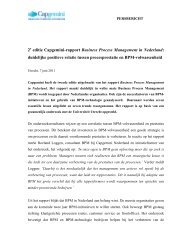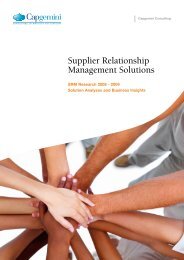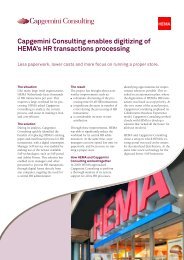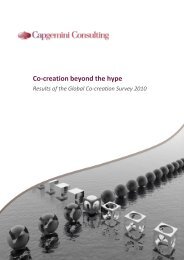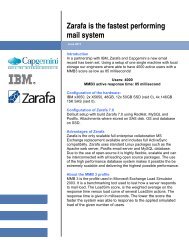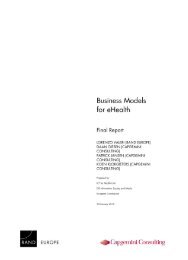PDF - 2.74 MB - Capgemini Consulting
PDF - 2.74 MB - Capgemini Consulting
PDF - 2.74 MB - Capgemini Consulting
You also want an ePaper? Increase the reach of your titles
YUMPU automatically turns print PDFs into web optimized ePapers that Google loves.
Energy, Utilities and Chemicals<br />
the way we see it<br />
Energy efficiency EU directive and its impacts<br />
on Utilities business models<br />
Energy Efficiency is a key stake for European<br />
Utilities today<br />
The ‘climate and energy package’ enacted by the European<br />
Union (EU) in June 2009 set a series of demanding<br />
climate and energy targets to be met by 2020, known as<br />
the “20-20-20” (reduction in EU greenhouse gas emissions<br />
of at least 20%, 20% of renewable energy in EU final<br />
energy consumption, 20% reduction in primary energy<br />
use to be achieved by improving Energy Efficiency).<br />
On June 22 2011, the European Commission unveiled a<br />
project of directive to ensure the target of 20% primary<br />
energy savings by 2020 is met. The Power Utility industry<br />
is the main sector targeted by this directive.<br />
What are potential impacts of this new directive for the<br />
industry How can this new legislation be used by the<br />
Utilities as an opportunity, rather than an additional<br />
regulatory constraint<br />
Whilst the 2 first objectives are articulated as binding<br />
legislation, the Energy Efficiency (EE) one is not. Given<br />
uncertainties for the EU in reaching this objective, the<br />
European Commission has been thinking about ways for<br />
helping Europe achieve this important objective.
The European Union Energy Efficiency Directive :<br />
The proposed directive established a common framework<br />
for promoting energy efficiency in the Union to ensure<br />
the target of 20% primary energy savings by 2020 is<br />
met.<br />
Following an assessment of national achievements planned<br />
in 2014, the European Commission might decide to<br />
reinforce the framework by adding binding targets.<br />
What does it mean for European Utilities <br />
The challenge for Utilities is to make EE obligations<br />
an opportunity for business development rather than<br />
another regulatory constraint – even if energy savings<br />
means a loss of revenue from energy supply in the short<br />
term:<br />
• Strong investment to avoid penalties by implementing<br />
EE measures<br />
• Significant internal evolution to face the new paradigm<br />
shift (new skills, dedicated organization, …)<br />
Energy Savings in EU<br />
Energy efficiency<br />
Directive<br />
Assessment of energy<br />
savings achieved :<br />
“is EU on-track ”<br />
Binding<br />
Scenario<br />
9% final energy savings<br />
(intermediate target)<br />
Timeline (& main inflection points of EE policy)<br />
20% primary energy<br />
savings (final target)<br />
2011 2014 2017 2020<br />
• Deep business model transformation to address EE<br />
obligations: Market strategy (positioning, offers, route to<br />
market, …), Customer relationship and Operational<br />
excellence (IT, process...<br />
The Energy Efficiency Directive is based on 5 main<br />
complementary core topics to achieve target of<br />
20% energy savings by 2020<br />
• Energy savings obligation scheme : National EE<br />
obligations schemes have to be implemented by each<br />
Member State<br />
Scenario 1 : energy savings are in line with EU targets<br />
Scenario 2 : energy savings are not in line with targets and binding targets are fixed by the EU<br />
• Smart metering & Billing : Savings obtained through<br />
cost-effective technologies like smart metering are key.<br />
Minimum requirements for billing are required<br />
The two main economic sectors targeted in this new<br />
directive are the Public sector and and the Power Utilities<br />
industry, with an ambitious objective of annual energy<br />
savings equivalent to 1.5% of energy sales in the<br />
previous year<br />
White certificate scheme at EU level is not recommended<br />
because of high administrative costs. However, Member<br />
States must implement national obligation schemes with<br />
savings targets and penalties.<br />
• Combined Heat and Power (CHP) district heating &<br />
cooling : High efficiency cogeneration and district heating<br />
& cooling have significant potential for saving primary<br />
energy<br />
• CHP Transmission & Distribution : High efficiency<br />
cogeneration electricity should be granted priority and<br />
non discriminatory access to the grid<br />
• Energy services: Development of both supply and demand<br />
for energy services should be further incentivized<br />
The Energy Efficiency Directive impacts the whole downstream value chain for Utilities<br />
District Heating<br />
& Cooling<br />
Distribution<br />
(metering)<br />
Electricity &<br />
Gas sales<br />
Energy<br />
services<br />
Main impacts for European Utilities<br />
• Include a maximum of<br />
energy from high<br />
efficiency cogeneration<br />
in district heating and<br />
cooling – develop<br />
connection of third<br />
party CHP to district<br />
heating & cooling<br />
systems<br />
• Set up heating &<br />
cooling development<br />
plans according to<br />
location of CHP plants<br />
• Guarantee origin for<br />
High efficiency CHP<br />
energy<br />
• Provide individual meters to all<br />
customers that accurately<br />
measure consumption and time<br />
of use for all energies<br />
(including heating)<br />
• Set up a plan for meters in<br />
collective housing, providing<br />
individual indicators<br />
• Develop e-billing<br />
• Coordinate smart meter roll<br />
out to be compliant by 2014<br />
& 2015<br />
• Implement new network tariffs<br />
favoring demand response<br />
initiatives<br />
• Develop system services to<br />
network users helping them to<br />
improve EE measures<br />
• Guarantee priority access to<br />
high efficiency CHP to the grid<br />
• Develop long term energy<br />
savings measures in order to<br />
achieve annual energy<br />
savings equal to 1.5% of<br />
energy sales in the previous<br />
year<br />
• Develop specific route to<br />
market for social groups<br />
affected by fuel poverty or<br />
living in social housing :<br />
special offers, financing,<br />
partnerships with local<br />
authority tenants…<br />
• Develop partnerships with<br />
ESCOs or other third parties<br />
non obligated but carrying<br />
EE measures<br />
• Set up a EU-wide plan for EE<br />
action, in order to optimize<br />
actions and meet obligations<br />
in all countries<br />
• Partner with small and medium<br />
Energy Services companies<br />
(ESCOs) to promote a large and<br />
competitive energy services<br />
market<br />
• Market and sell efficient energy<br />
services to all customers, even<br />
the ones not contracted for<br />
energy supply – develop services<br />
offers and route to market for all<br />
customers on services<br />
• Provide a list of available ESCOs<br />
to final customers<br />
• Provide model contracts for<br />
energy performance in the<br />
public sector<br />
• Provide information on<br />
guaranteed energy savings and<br />
financing available for final<br />
customers<br />
2
Energy, Utilities and Chemicals<br />
the way we see it<br />
Learnings from European forerunner countries<br />
in Energy Efficiency : development of different<br />
models around energy savings obligations<br />
Five countries have set strong energy savings obligation<br />
schemes for a few years (France, the United Kingdom,<br />
Italy, Belgium and Denmark). Several key learnings can<br />
be drawn from analysing each of them in details.<br />
In spite of countries specificities, most of EE regulations<br />
in Europe rely on standard measures to be implemented<br />
by utility players (distributors or suppliers)<br />
However, main measures implemented (heating, equipment,<br />
insulation...) vary strongly depending on countries<br />
legislation and market structure<br />
In order to avoid penalties that can be very high (e.g.,<br />
more than €.2.5 Billion for EDF), all European utilities<br />
in countries with EE regulation changed their business<br />
model - to a different extent:<br />
• Positioning on EE services is key<br />
• Developing services means having a dedicated services<br />
division or partners<br />
Degree of professionalization in selling and marketing EE<br />
services varies between countries.<br />
• UK Utilities have become energy services providers,<br />
thanks to existing assets like owned installation services<br />
for boilers and heating pumps<br />
• Danish and French Utilities - with different models -<br />
developed partnerships to achieve their EE obligation<br />
and sell services<br />
• Italian and Belgian Utilities developed services but did<br />
not push them strongly on the market<br />
ESCOs did not develop significantly across EU as such, but<br />
several Utilities have entered into Energy Services instead.<br />
Energy Efficiency roadmap of selected EU<br />
countries<br />
Business models transformation and route to market for<br />
European countries studied<br />
HIGH<br />
DEGREE OF BUSINESS MODEL<br />
TRANSFORMATION<br />
LOW<br />
Partnerships<br />
Denmark<br />
France<br />
Italy<br />
ROUTE<br />
TO MARKET<br />
High maturity in business model transformation means<br />
well developed owned services to address directly end<br />
customers (network of installers, e.g.), coupled with targeted<br />
partnerships (with manufacturers, e.g.)<br />
When national regulation has structural constraints,<br />
Utilities develop partnerships to propose quickly new<br />
energy services to end customers and collect certificates<br />
Moderate regulation implies limited transformation of<br />
business models and development of incremental offers<br />
(mainly through owned services) to get quick wins<br />
Development of owned services coupled with strategic<br />
partnerships is key to deeply transform Utilities<br />
business model, and ensure business development on EE<br />
services<br />
UK<br />
Size depends on strength of regulation obligations<br />
Tendency in the next 5 years<br />
Belgium<br />
(Flanders)<br />
Owned<br />
services<br />
Regarding EU directive and existing EE regulation, white certificate schemes are expected to grow on<br />
each national market and four levers will enable Member States to design their own obligation scheme<br />
Obligation scheme:<br />
degree of constraint<br />
Obliged bodies in Utilities:<br />
Suppliers vs. distributors<br />
Obliged sectors of energy savings:<br />
degree of B to B implication<br />
Complementary regulations:<br />
Tax credits<br />
Utilities need to work on 4 themes to make EE regulation an opportunity for business development<br />
Business case Lobbying Marketing & Sales Operations<br />
• Quantify impacts of EE<br />
regulation<br />
• Assess equipment and<br />
construction sectors in core<br />
markets to determine best<br />
route to market in terms of<br />
partnership<br />
• Build up a dedicated<br />
business plan<br />
• Lobby on complementary<br />
regulation to incent relevant<br />
actions and decrease cost<br />
pressure<br />
• Lobby on the four levers to<br />
design an obligation model<br />
that would fit Utilities strategy<br />
and capabilities<br />
• Strengthen customer<br />
knowledge<br />
• Develop relevant offers and<br />
services to address the market<br />
and meet obligations<br />
• Determine sales channel and<br />
communication strategy for<br />
EE services<br />
• Develop owned services or<br />
partnerships<br />
• Develop a dedicated team<br />
driving investments and<br />
monitoring results of EE<br />
actions<br />
• Set up new capabilities and<br />
support cultural change<br />
caused by marketing and<br />
selling of new services<br />
• Work on operational<br />
excellence (processes and<br />
tools)<br />
3
About <strong>Capgemini</strong> and <strong>Capgemini</strong> <strong>Consulting</strong><br />
With more than 115,000<br />
people in 40 countries, <strong>Capgemini</strong> is one<br />
of the world’s foremost providers of<br />
consulting, technology and outsourcing<br />
services. The Group reported 2010<br />
global revenues of EUR 8.7 billion.<br />
Together with its clients, <strong>Capgemini</strong><br />
creates and delivers business and<br />
technology solutions that fit their needs<br />
and drive the results they want. A deeply<br />
multicultural organization, <strong>Capgemini</strong><br />
has developed its own way of working,<br />
the Collaborative Business Experience TM ,<br />
and draws on Rightshore®, its<br />
worldwide delivery model.<br />
For more information:<br />
www.capgemini.com<br />
<strong>Capgemini</strong> <strong>Consulting</strong> is the Global<br />
Strategy and Transformation <strong>Consulting</strong><br />
brand of the <strong>Capgemini</strong> Group,<br />
specializing in advising and supporting<br />
organizations in transforming their<br />
business, from the development of<br />
innovative strategy through to execution,<br />
with a consistent focus on sustainable<br />
results. <strong>Capgemini</strong> <strong>Consulting</strong> proposes<br />
to leading companies and governments<br />
a fresh approach which uses innovative<br />
methods, technology and the talents of<br />
over 3,600 consultants worldwide.<br />
For more information:<br />
http://www.capgemini-consulting.com/<br />
Rightshore® is a trademark belonging to <strong>Capgemini</strong><br />
Contacts :<br />
Arnaud Bouchard<br />
Vice President - Practice Marketing, Sales & Service<br />
arnaud.bouchard@capgemini.com<br />
Sebastien Joubert<br />
Managing Consultant, Marketing, Sales & Service<br />
sebastien.joubert@capgemini.com<br />
Alain Chardon<br />
Principal, Industry, Services and Utilities<br />
alain.chardon@capgemini.com<br />
Philippe Coquet<br />
Utilities Strategy Lab lead, Energy & Utilities<br />
Global Sector Network<br />
philippe.coquet@capgemini.com<br />
Naima Makri<br />
Consultant, Marketing, Sales & Service<br />
naima.makri@capgemini.com<br />
<strong>Capgemini</strong> <strong>Consulting</strong> is the strategy and transformation consulting brand of <strong>Capgemini</strong> Group<br />
The information contained in this document is proprietary. © 2011 <strong>Capgemini</strong>. All rights reserved.


